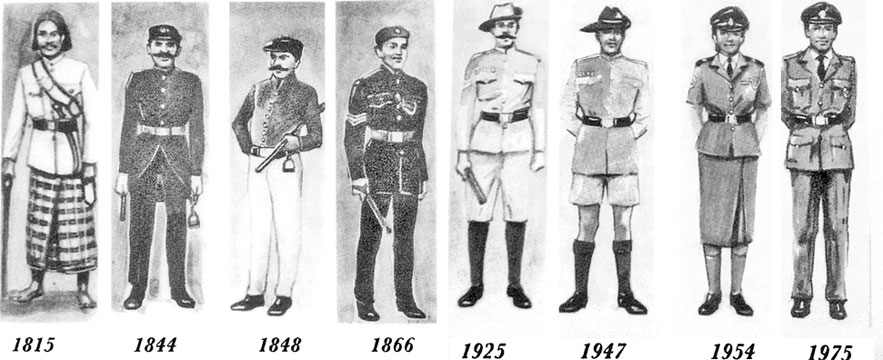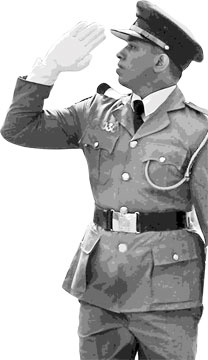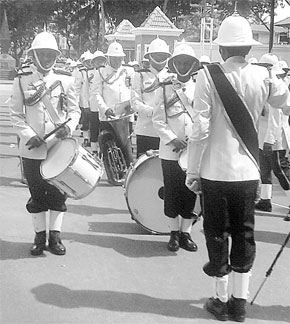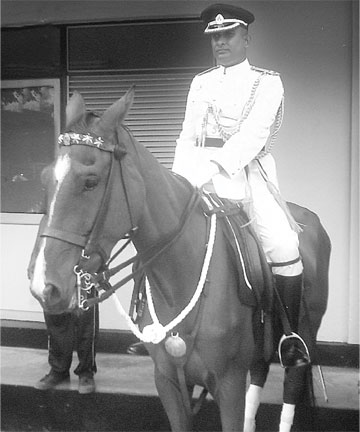GUARDIANS OF THE LAW
Serving the nation for 150 years:
By Dishan Joseph

For centuries Sri Lankans have been a nation of peace-loving citizens
living in harmony. During the Portuguese occupation of ancient Ceylon,
they did not perceive the need for a uniformed Police force.
Subsequently, the Dutch gained total control of the Maritime Provinces
and the northern peninsula by 1658. The Colombo Municipality initiated a
system of hiring paid guards to patrol Colombo city at night. Once the
British began to establish their dominion over Ceylon the Office of the
Fiscal was given authority to supervise Police duties. As the city was
invaded by urbanization the Fiscal was unable to administer the Police
functions entrusted to him. The oldest Police station was set up in Fort
in 1797 to facilitate patrol duties.
 Governor Fredric North began to redefine the functions of the Police
in 1805. A Police Vidane (officer) was appointed in rural villages for
the prevention of crime. Governor North directed that Colombo city be
divided into 15 divisions (the outlines survive to this day). Police
Constables were recruited and trained. The Governor was keen to
restructure the Police and made a request to the Governor of Bombay to
recommend a diligent officer. The name of William.R.Campbell, who was in
charge of the Indian Rathnagiri Rangers, was proposed and accepted. Governor Fredric North began to redefine the functions of the Police
in 1805. A Police Vidane (officer) was appointed in rural villages for
the prevention of crime. Governor North directed that Colombo city be
divided into 15 divisions (the outlines survive to this day). Police
Constables were recruited and trained. The Governor was keen to
restructure the Police and made a request to the Governor of Bombay to
recommend a diligent officer. The name of William.R.Campbell, who was in
charge of the Indian Rathnagiri Rangers, was proposed and accepted.
Duties
Campbell arrived in our island and assumed duties as the first Chief
Superintendent of Police on September 3, 1866. Therefore this date is
recorded as the day that the uniformed Police Force was established in
Ceylon. Thomas Oswin was appointed as the first Superintendent of Police
for Colombo. Subsequently the Police cadre had strength of 560 men
serving in 44 stations when our island's population was 2 million. Today
the Police cadre consists of 84,000 men and women serving in 442
stations and other divisions.
In 1867 the first Police Headquarters was set up at Maradana.
Lokubanda Dunuwila became the first Sri Lankan to be appointed to the
rank of Superintendent of Police and was deployed to head the Kandy
range. In Colombo the ranks were restructured to recognize Police
Inspectors, Sergeants and Constables. For the first time the rank of
Assistant Superintendent of Police (ASP) was created. De La Harpe was
promoted as the first ASP.
The Criminal Investigation Department (CID) was initiated in 1870.
According to DIG Priyantha Jayakody, Director Crimes and Crime
Intelligence, the CID probes complicated crimes with specialized
branches dealing with homicide, gang robbery (banks etc), frauds and
counterfeit currency. The CID is the coordinating point of contact for
Interpol.
|

Police Band |
Steps have been taken to update the Fingerprint Branch with AFIS
(Automated Finger Identification System) which is presently linked to 42
territorial sections where a suspect's fingerprint(s) can be matched
online within three minutes. There are presently 47,000 fingerprints of
IRCs (Island Reconvicted Criminals). The CID has also embarked on a
program to update facial recognition technology, whereby comparisons can
be made from CCTV footage.
Shifted
The Police Headquarters was shifted to Fort in 1932 from where it
operates to this day. In 1947 Richard Aluvihare became the first Sri
Lankan to be appointed as Inspector General of Police, in a service once
dominated by the British. He is credited with transforming the force and
introducing the Police Kennels division which is presently headquartered
in Asgiriya, Kandy and operates from 54 units, islandwide with strength
of 203 trained dogs who excel in narcotics and explosives detection.
Sir Richard recruited female cadre into active regular service. As
vehicles began to converge on the once quiet streets the Traffic Range
was set up and it today has blossomed into an active unit with a highway
patrol. In 1952 for the first time VHF Radio was introduced to connect
all stations enhancing communications facilities.
Today that facility is coordinated from Mirihana. The menace of
illegal narcotics began to filter into our region in the 70s.
The Police Narcotic Prevention Bureau was set up in 1973 and has
conducted many successful raids seizing large hauls of narcotic
substances. However, illegal drugs continue to invade and enslave many
youth.
Sri Lanka was plagued with many forms of internal insurgency. In
order to counter this, the Department established the Special Task Force
in 1983, based on the Gendarmerie Nationale of France and GSG-9 of
Germany. These officers received training in jungle warfare and today
play a pivotal role in the areas of counter terrorism, hostage rescue,
bomb disposal, transport of high profile prisoners and VIP security.
|

Mounted Police |
Reminiscing his days as the Personal Security Officer to President
J.R. Jayewardene, retired DIG Muni Gomes recollects the time he was sent
to Germany to procure a bullet proof car, which was a pioneering step to
enhance the safety of the Head of State. This Israel trained veteran
opines that a clear and alert mind is a key asset in close protection
duty.
Rapport
Since assuming the mantle of the Police service the incumbent IGP
Pujith Jayasundera has emphasized the need to enhance the rapport with
the public. It is very timely that the new Code of Ethics for the Police
has also been launched, to enhance the requirement for a people friendly
law enforcement entity.The150th anniversary was celebrated with much
pomp and decorum under the leadership of the IGP with a stunning parade
at Police Park on September 3.
The parade was commanded by Senior DIG Ravi Wijegunawardene, who rode
a majestic black stallion accompanied by seven platoons including
members of the Mounted Division, Kennels and STF. The precision Silent
Drill marching display by the STF carrying .303 bolt action rifles is
testament to their high level of training, discipline and teamwork.
The entire drill is done without a single verbal command. The present
Commandant STF Senior DIG Latheef stated that this is a display of
professionalism and competence.
During the three decades of conflict many officers were killed and
disabled.
The Police Heroes Day is commemorated on March 21 every year. To date
3,110 policemen have been killed in action. Many have been bestowed with
the Presidents Gallantry Medal.
We must remember the sacrifice of these officers who laid down their
lives in the line of duty. The Police service will strive to meet the
new challenges that lie ahead with determination, as we aspire to become
a prosperous and safe nation.
|

